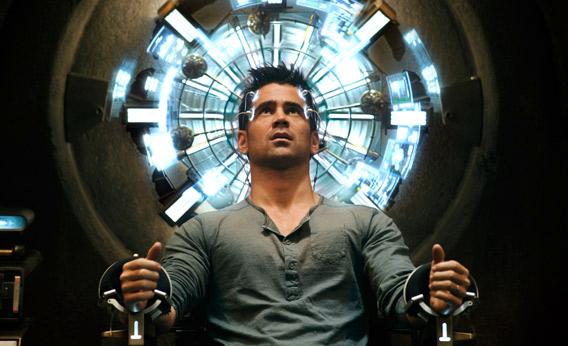Total Recall
Not a total waste of time.

Michael Gibson/Columbia Pictures © 2011.
After you’ve watched Total Recall, come back and listen to our Spoiler Special discussion with Dana Stevens and Chris Wade. You can also download the podcast here.
The Philip K. Dick story “We Can Remember It for You Wholesale,” like much of Dick’s work, seems at once wildly cinematic and, in its essence, unfilmable. The Moebius-strip structure of this futuristic tale proposes two alternate realities that seem to shift and morph into one another: Either the protagonist is an everyday working schmo who pays to take a “virtual vacation” to Mars at a memory-implant firm called Rekal Incorporated, or he’s a secret government agent who actually has spent time on Mars, and whose memory of what happened there has been imperfectly erased by Rekal in an attempt to make him believe he’s just a working schmo. The stunning ending, which leaves open the possibility that both scenarios may be true while also suggesting the hero may be a raving madman, is an example of the kind of conceptual gymnastics that great science fiction can perform.
Of course, movie adaptations from works of literature aren’t only worthwhile to the extent that they resemble the stories they’re based on. Paul Verhoeven’s 1990 thriller Total Recall preserved only the bare bones premise of Dick’s short story, while replacing its tone of bleak noir pessimism with one of cheerfully gonzo high camp. But the original Total Recall is a blast of a movie, full of hairpin plot twists and wittily choreographed action, not to mention the unforgettably bizarre, so-wrong-it’s-right casting of Arnold Schwarzenegger as everyman hero Douglas Quaid. (The ascension of an inexpressive, heavily accented Austrian bodybuilder to the pinnacle of Hollywood stardom, and from there to the governorship of California, is an alternate reality not even Dick could have imagined.)
The new Total Recall remake, directed by the Underworld franchise’s Len Wiseman, relies more closely on the 1990 movie than on the original source. But that old Verhoeven joie de vivre—the supersaturated colors, the broad performances, the gleefully high body count—has been replaced with a more fashionable brand of techno-gloom. Everything of note in this movie is pretty much a straight lift from another, better science fiction movie: The sharpest story turns all come straight from the 1990 version, while the impressively layered production design ransacks Blade Runner for visual ideas (the vertically stacked city, the competing multilingual signage). There’s even a white-clad robot army that seems to have gone AWOL en masse from Star Wars.
In Wiseman’s version, the Mars angle has dropped out entirely (perhaps for some of the reasons Bryan Curtis mentions in his discussion of science fiction’s retreat from the Red Planet). Instead, the earth itself has become uninhabitable territory after a chemical-warfare disaster. Only two spots on the planet remain habitable: the ominous “United Federation of Britain” and the entire continent of Australia, now known as “the Colony.” The Colony’s inhabitants must travel from their squalid, overcrowded (but cool-as-hell-looking) slums to their menial jobs in the wealthy Federation via the earth’s only remaining means of long-distance travel: the Fall, a huge elevator that drops clear through the core of the earth and dumps you out on the other side. (The Fall is one element of the story that’s new to this version, and I kind of loved the completeness with which the whole absurd thing was imagined, from the design of the landing docks to the detail that the entire Colony-to-UFB voyage takes only 17 minutes. Why isn’t American ingenuity already at work on this exciting new travel technology? Let’s get tunneling!)
Colony-dwelling sad sack Doug Quaid (Colin Farrell) dreams of a more exciting and glamorous life—he even reads a James Bond paperback as he commutes on the Fall (which, this being the end of the 21st century, is very retro of him.) Ignoring the warnings of his co-worker (Bokeem Woodbine), Quaid insists on visiting the offices of Rekall, where he pays for a chemical implant that will give him a false memory of a thrilling past. And here’s where the story bifurcates and the whoa-dude sci-fi ideas kick in: What happens next, and for the rest of the movie, could be either Quaid’s paranoid post-implantation delusion or a real quest to liberate the Colony from its conniving occupier, Cohagen (Bryan Cranston) while being pursued by a ruthless assailant who, up until that very morning, Quaid had assumed was his loving wife.
The icily impenetrable Kate Beckinsale, Wiseman’s wife in real life, plays a woman so dedicated to her task, she starts to resemble a video-game villain—whenever there’s a lull in the action, out she pops from the shadows for another round of kickboxing. Jessica Biel, as the nice girl (or maybe just a hologram of a nice girl) who helps Quaid adjust to his new identity, is so physically similar to Beckinsale it’s sometimes hard to tell them apart—perhaps a deliberate choice on the director’s part, but if so, he should have included more scenes that played on the resemblance. As for Farrell, his sad-eyed, permanently quizzical face is well-suited for playing a character whose identity keeps becoming subject to erasure.
Just because it’s rarely original doesn’t mean Total Recall is never any fun; this is a taut, serviceable sci-fi thriller with a couple of neat visual ideas, and if you’re not familiar with either the Schwarzenegger version or the original story, the brain-bending twists alone will take you a reasonably long way.
